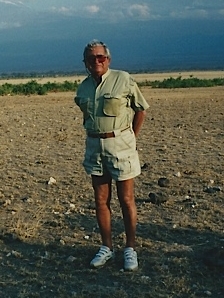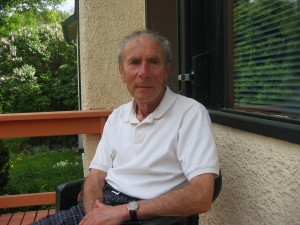Auschwitz anniversary reverberates
February 10th, 2015

There are more than a few books by B.C. authors that pertain to the Holocaust.
A section of Undaunted: The Best of B.C. BookWorld recognizes some of these Jewish authors who have been featured in B.C. BookWorld–such as Michael Mielnicki, Barbara Ruth Bluman, Leon Kahn, Rhodea Shandler, Lillian Boraks-Nemetz, Eva Hoffman, Irene Watts, Rhoda Kaellis, Helen Moszkiewiez, Fraidie Martz, Steve Floris and, most importantly, Rudy Vrba. David Lester, Lisa Hobbs Birnie and Heather Pringle are non-Jewish authors who have also contributed important books.
Now, on the 70th anniversary of Auschwitz, we can add the names of two more Jews who have written Holcaust memoirs in B.C., Ernst Frinton and Rene Goldman
*
Dr. Ernst Frinton (nee Arnost Frischler) published his Memories – An Autobiography back in 1994. There is a quotation (anonymous) on the book’s front page: “Memories are a person’s life – For we possess nothing certain except the past – which is always with us”.
Frinton was born of poor Jewish parents in 1917. His father was a cobbler, his mother repaired and altered clothing. He grew up in Ostrava, an industrial town of the then Czechoslovak Republic, with a complex mixture of Czech, German, Polish and Jewish residents. A popular student, he was involved in social-democratic activities and hoped to become a physician. With much sacrifice from the family he entered Medical School at the German University in Prague in 1935.
Frinton was in the third year of his studies when the Nazis took over the University. Frinton and his politically active friends had to flee the country. Upon his arrival in England, the British Committee for Refugees from Czechoslovakia placed him with a family in the countryside. He found a way to carry on his medical studies at St. Mungo’s College, one of the oldest medical schools in Glasgow. While still in school, he married Lili, herself a refugee from Berlin. She was looking after refugee children from Germany and Austria, a program financially supported by the Glasgow Jewish Community.
Dr. Frinton started in General Practice in the slums of Glasgow. In 1945, a few months after the war was over, the news came that his mother and sister had died in Auschwitz; his father never returned from the labor camp. Lili and Ernst’s first child was born in 1946. Next year the family moved to Liverpool where Frinton was offered an assistantship in a general practice. After two years, still not being able to find a medical practice with a future, they emigrated to Canada.
In Canada, Frinton accepted a coal mine union-funded medical position in the foothills of the Rocky Mountains in Alberta. After a slow start in 1949, a busy medical practice evolved. In 1950 the Frintons’ second child was born. Despite having endured and loved their time in Coal Valley, it was time to move on, and the family settled in the greater Vancouver area. Frinton and partners developed a busy general practice in the Cloverdale and Surrey area of the Lower Mainland – but by 1957 he was both exhausted and suffered from recurrent back pain.
Frinton decided to specialize in radiology. The family moved back to England, where Frinton started his two-year specialty studies at the Institute of Radiology in London. After a year Lili was expecting their third child, and they returned to Vancouver before the baby was due. Frinton completed his speciality training at St Paul’s Hospital in Vancouver and in the USA and settled into a busy radiology practice in New Westminster for the next twenty years, retiring in 1982.
Of his retirement years. Frinton writes: “So life goes on… I am happy that I have lived a long life… A good wife, three loving children, two beautiful granddaughters, many good friends, financial security… I often feel guilty to have all this while my parents and in particular, my younger sister, who was probably a better human being than I am, had to perish in misery… Life is not fair.”
[Information provided via George Szasz]
*
Rene Goldman, who taught at UBC and retired to Summerland, is a childhood survivor of the Holocaust. His self-published memoir is Childhood on the Move: Memoirs of a child-survivor of the Holocaust (2014). He writes:
“This book is more than a narration of my life during the sadly unforgettable years of the Shoah, when death lay in wait for me at every turn of a winding road for no cause other than my Jewish birth. I deem it nothing short of miraculous that I survived that time of anguish and pain.
“I survived in the shadow of terror across three countries in succession: Luxembourg, where I was born, Belgium, where my parents thought we had found refuge in 1940, and France, where I suffered the most tragic moments of my life, notably the successive loss of my mother and my father.
“It was in France, where the government and its police collaborated so zealously with the “Final Solution”, that I experienced my own closest brush with death. More than half of my book is devoted to the years in which I grew up in France: from 1942 to 1950.
“From my recollections of the years when the necessity to evade the ubiquitous threat required that I be moved “from pillar to post”, I proceed to an account of the years that followed the Second World War, when I was raised in a succession of children’s homes (orphanages) in France, then lived for three years in Poland, where I completed my secondary education and next, began my university studies in China. All told, this memoir encompasses the first twenty years of my life.
“This book is, however, no bare chronological narrative; woven into the tapestry of my recollections are observations on the historical events and Zeitgeist that impacted my destiny, besides passing reflections concerning politics, culture, and life in general.
“I bear witness to a tragedy unprecedented in history, during which six million Jews, including my entire family in Poland, with the single exception of one uncle, were murdered in cold blood. I seek here to offer my modest contribution to the perpetuation of the memory of that tragedy in the fervent hope that it will neither be forgotten, nor denied. May present and future readers find in these memoirs matter for reflection and, perhaps will some discover in them an avenue of research.
“I belong to the generation of survivors, who in the 1980s received recognition as a class different from that of adult survivors of the Shoah. We are known as the “child-survivors”, who were too young to comprehend why the Nazis and their collaborators across Europe waged a war of extermination against us. We are also known as the “hidden children”, since we survived in hiding in various ways, mainly under the protection of caring Gentiles.
“Like many of my peers, I have over the decades written and spoken publicly in schools, universities, churches, about my personal experience as a child-survivor of the Shoah. My family and people of various walks of life have encouraged me to write my story. Thus motivated, I put pen to paper in the late evening of my life.”
BOOKS:
Memories – an autobiography by Ernst Frinton (1994) 431 pages
Deskside publishing, Vancouver, B.C.
ISBN 09697688-1-8
Childhood on the Move: Memoirs of a child-survivor of the Holocaust (2014).
Available from author. $20
ISBN 978-0-9876780-7-2
Printed by Island Blue in Victoria




Thank you very much for sharing these stories now, when Holocaust deniers multiply.